In April 1992, a small band of Cambodian refugees marched alongside orange-swathed monks, as they slowly made their way across the Thai-Cambodian border. So began the first of what would become known as an annual Dhammayatria, or 'procession for peace'.

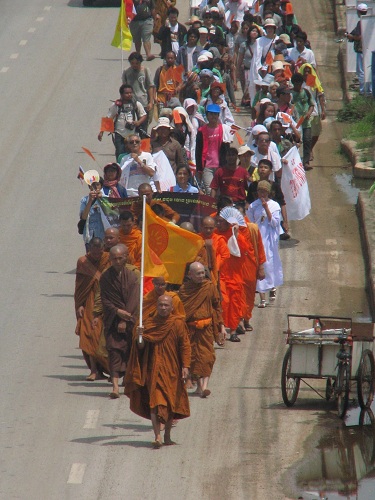
Earlier this week, responding to the recent escalation in troop manoeuvres and fighting at the contested border near the site of the Khmer ruins of Preah Vihear, hundreds of people marched to "to show the serious desire of the two peoples (Thai and Khmer) for harmony and peace."
A diverse group of representatives from Thailand, Cambodia, Laos, Burma, Japan, Sri Lanka, Indonesia, Australia and Greece each took part in the three-day event. Set in the eastern border town of Aranyaprathet, some 300km northeast of Bangkok, religious leaders, local villagers, academics, students, peace activists and non-government organizations gathered to take part in both the symbolic peace procession and conflict mediation.
Calling for the gathered crowd to "create peace within, to walk together as one," participants began their march at Wat Klongyang, before moving on to Wat Mai Sai Thong, along the city's major highway. But for the sounds of 11th Infantry regiment soldiers at a local base, marching themselves in formation - "noeng, song, saam, si!" - little else could be heard. Over several kilometres, the crowd marched in silence, carrying hand-painted signs which called for "humanism, rather than nationalism".
Almost all were affected by the near-blistering forty-degree heat, with paramedics called upon to attend to any number of cuts and burns acquired from the searingly hot bitumen. Stopping briefly to attend to their wounds and recover, many of those affected continued onwards to complete the journey. Despite the difficult conditions, a number of observers noted the composure of the crowd, who maintained high spirits throughout.
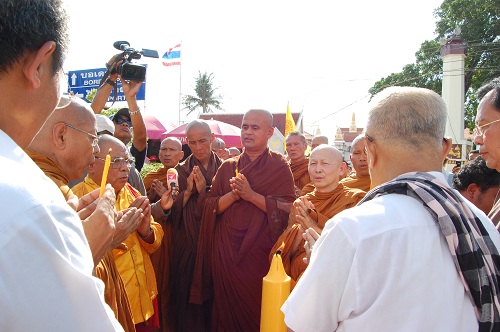
Reaching the border after some five hours, the procession was met, albeit with some delay, by their Cambodian counterparts. "Only those with passports were able to get through the border, and they are few," said Chalida Tajaroensuk, an event organizer. "They faced many problems on the Cambodian side, especially... In the end, of the two hundred Cambodians who wished to join the walk, only twenty were allowed through."
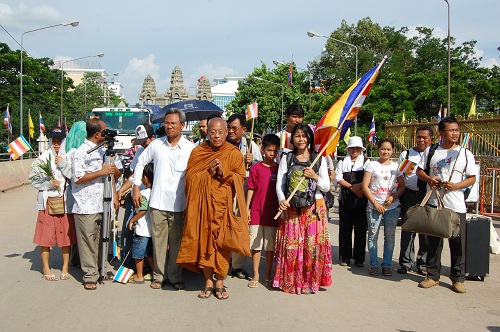
Representatives from Cambodia
"But we're glad to have made it," said a cross-border participant, dousing herself in cold water. "I don't know how the elderly, in particular, managed it."

Greetings from both sides
As events shifted from the completion of this symbolic act, discussion would soon turn to matters of conflict mediation and resolution.
In his welcoming speech, social critic and Buddhist activist Acharn Sulak Sivaraksa emphasized his view that peace could be obtained if Thailand formally apologized to Cambodia. "Our way of teaching history is nationalistic and discriminatory against our neighbours," he said, bolt upright in his chair. "Thailand should apologize to Cambodia, because we have looked down on them. Without an apology, the Dhammayatria is a waste."
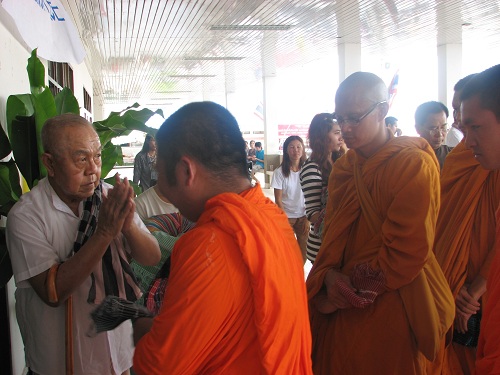
Sulak welcoming Cambodian and Thai monks
"We think we are better than Cambodia," he continued. "because we have never been colonized. But we have been colonized by this way of thinking."
He reiterated what would then emerge as a key theme: that, as with Buddhist practice, actions of peace begin from within. "Conflict resolution must start internally," he said. "We may have begun with bad things in our hearts. Now is time to remember our good side, too."
With its focus, awareness and peaceful orientation, Buddhism, Ajarn Sulak argued, offered a way forward in the difficult process of cross-border mediation. "There are three fundamental principles of conflict resolution in Buddhism," he explained. "Maintaining the good in everyday life… focus … and intelligence… With these, we can soon resolve the conflict from within… But, remember," he warned. "This is an election period. In an election, people are trying to get your votes. So tell both parties how you feel about (the conflict)."
"These are very ordinary things we have to learn," noted Khun Ros Suttha, representative from Cambodia. "If we do not recognize the root causes of the Thai-Cambodian conflict, then this will lead us to no resolution."
A number of representatives from Cambodia, many themselves survivors of the Khmer Rouge, spoke of having long since tired of the emotional, physical and financial strains, of constant warfare and uncertainty. "Given the decade of diaspora return and national reconstruction in Cambodia, the Dhammayatria and its philosophy of non-violence have been a particularly powerful message for Cambodians tired of war," academic Kathryn Poethig wrote of the first Cambodian Peace Walk, in 1992. Some two decades later, Khun Ros would reaffirm this sentiment.
"If we are Buddhists, we have to recognize that Cambodians were in a war for many years," he argued. "We don't want to create a new war… We have suffered enough."
He felt that "we (Cambodians) already know Thailand is much better than other countries in Southeast Asia. But we don't want to see it take a step backwards, becoming like Cambodia during the Khmer Rouge era. We have already sent a letter to the government, asking them to stop the war.
“We need to learn more about each other. I'm sure our histories will find we are friends. And next time - we will invite both governments, and their families - we will cover the expenses! - so that they can see what people are doing together. The most important thing we have to realize is that even amid conflict, we have to consider the future."
At an event which called for 'People to People, Seeking Peace', a number of both Thai and Cambodian representatives took to the stage. In a moderated session, they were asked to express what they wished to say to, or ask of one another. A young Cambodian woman, in tears, asked that Thailand, "please forgive us. Please forgive us if we… If we have done anything, we are sorry," to which Thai representatives responded, unanimously: "Please forgive us, also… If we have done something to disappoint you."
A panelist from Ubon Ratchathani University noted that while person-to-person dialogue proved valuable, "the governments should apologize, since it's not a conflict between people."
Prof. Parichart Suwanbubbha, Deputy Director of Mahidol University's Research Centre for Peace Building, also attended the event. As she saw it, with her extensive experience in conflict mediation, "the Dhammayatria had proved to be another important form of peace dialogue." She urged local citizens "to continue with this kind of 'interconnectedness,' as it will help us reach our goal," she said, "and our goal is to learn to genuinely respect one another."
Local participants from both Thailand and Cambodia noted that they felt embedded in one another's communities, with trade, families and cultures engaging across a national border most often described as 'blurred'.
At the concluding session, participants gathered in a local community hall. There, monks blessed the crowd, showered them with heavy drops of water. Hands were clasped and knots of friendship tied over across the symbolic, if fragile, border.
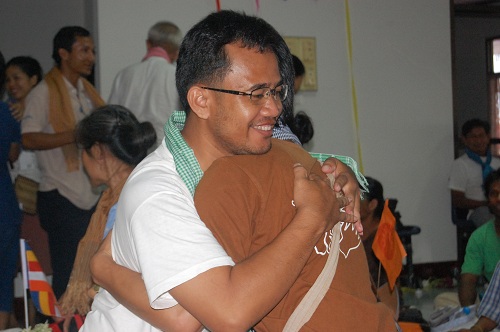
"It may seem like a very small thing," Ajarn Parichart noted later. "But for these people, it matters a lot."
Prachatai English is an independent, non-profit news outlet committed to covering underreported issues in Thailand, especially about democratization and human rights, despite pressure from the authorities. Your support will ensure that we stay a professional media source and be able to meet the challenges and deliver in-depth reporting.
• Simple steps to support Prachatai English
1. Bank transfer to account “โครงการหนังสือพิมพ์อินเทอร์เน็ต ประชาไท” or “Prachatai Online Newspaper” 091-0-21689-4, Krungthai Bank
2. Or, Transfer money via Paypal, to e-mail address: [email protected], please leave a comment on the transaction as “For Prachatai English”
